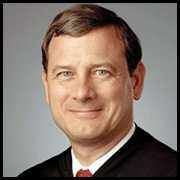Heretic’s Home

Many religious conservatives were until recently quite pleased with President George W. Bush’s decision to appoint John Roberts, a Circuit Judge of the District of Columbia, as retiring Justice Sondra Day O’Connor’s successor on the highest court of the land.
Tony Perkins of the Family Research council
said the Supreme Court nominee is well respected for his “fair judgment, intellect and integrity ”who “will strictly interpret the Constitution and not legislate from the bench.” Jan LaRue of Concerned Women for America said that “everything we know about Judge Roberts tells us that he fulfills the President’s promise to nominate a judge who will strictly interpret the Constitution and not legislate from the bench” but the enthusiasm coming from their side of the aisle has dampened somewhat after The Los Angeles Times
published an article concerning his involvement in a landmark gay rights case back in 1996.
Mr. Perkins now expresses some reservations
concerning Mr. Roberts nomination though he still backs the president and as of yet, did not retract his statement of support for the Supreme Court nominee. His “initial reaction” to the news was that Mr. Roberts was “aiding and abetting” a group whose values are in conflict with that of the religious conservatives and Mr. Paul Weyrich said the judge should have risked his job and declined to take this pro bono case on behalf of gay rights advocates.
Mr. Roberts, then affiliated with the Hogan & Hartson, was approached by the head of the pro bono department at the firm and asked to help Jean Dubofsky, the lead attorney seeking to overturn a state constitutional amendment barring
Colorado’s governing bodies from protecting gays and lesbians from discrimination:
The amendment reads as follows:
"No Protected Status Based on Homosexual, Lesbian, or Bisexual Orientation. Neither the State of Colorado, through any of its branches or departments, nor any of its agencies, political subdivisions, municipalities or school districts, shall enact, adopt or enforce any statute, regulation, ordinance or policy whereby homosexual, lesbian or bisexual orientation, conduct, practices or relationships shall constitute or otherwise be the basis of or entitle any person or class of persons to have or claim any minority status, quota preferences, protected status or claim of discrimination. This Section of the Constitution shall be in all respects self-executing."
In effect, the amendment, which passed with 54% voter approval in 1992, repealed the governor’s 1990 executive order barring employment discrimination against gays Colorado’s Insurance Code forbidding insurers from considering one’s sexual orientation when reviewing one’s eligibility and premiums, and similar level of protection offered by any other state or local governing body within the state. Gays could not seek redress for what they viewed as wrongful discrimination without first appealing to the state to repeal is own constitutional amendment.
The state’s highest court overturned the amendment but gay rights activists feared a reversal after the Supreme Court decided to hear the state’s petition for a reversal. Jean Dubofsky was ultimately successful, however, and the activists’ fear proved unfounded. The six-justice majority led by swing Justice Anthony Kennedy ruled against the state and affirmed the decision reached by the state and lower courts because it imposed a substantial disadvantage in a whole wide array of civic activities on a single group of people subject to ridicule, contempt, and scorn.
Mr. Roberts’ own role in this effort is not clear. He did not partake in the oral arguments for those familiar with that case would know that Jean Dubofsky herself went in front of the judges and answered oral arguments, but Mr. Roberts did serve on a moot court panel to prepare her for the oral arguments and Mrs. Dubofsky viewed his limited time with her as “crucial” in winning a majority on the Supreme Court.
Religious conservatives were not pleased with the outcome or the legal reasoning involved but they have not yet come out against Mr. Roberts. Mr. Perkins’ press release following these revelations urges caution before leaping to conclusions:
"As a former policy maker and now full-time advocate for family values, my first thought in response to the LA Times story was 'aiding and abetting,' which I would venture to say is how many of our supporters would see this news. However, I urge caution in jumping to that conclusion. "Judge Roberts was an attorney with a large firm where helping colleagues when called upon was expected. Attorneys are not necessarily advocates or activists. In fact, activists are exactly what we don't want on the court. I spent the good part of yesterday on the phone and in meetings to get the facts. I have verified that his involvement was limited to about 5 hours of participation in a moot court as he played the role of one of the High Court's conservative members asking tough hypothetical questions of the attorneys who actually prepared and argued the case.”
The latest revelation may say more about President Bush’s nomination strategy and activists who are taking sides more than the nominee himself. The president’s nomination strategy has up to now been to minimize Mr. Roberts’ own legal views on school prayer and overturning abortion rights by suggesting that he was acting on behalf of his client – the United States government. We have been told that Mr. Roberts will not answer any questions about pending legal cases or those concerning hot button social issues because that would require him to prejudge cases without reading the briefs, and deliberating with his potential colleagues on the Court.
Mr. Roberts’ legal analysis made on behalf of the government and in private practice may reveal something about the man as judge or it may not. He says that he was acting on behalf of his clients and like any good attorney, he provided sound legal counsel for those clients.
Liberal activists are not buying it and are using the legal work he did on behalf of the United States government to portray him as a right-wing conservative judge who will vote with Justice Antonin Scalia, William Rehnquist, and Clarence Thomas to overturn privacy rights, narrow protections from government-based discrimination, and overturn environmental protection legislation.
Fair enough. He chose to align himself with conservative administrations and he chose to sign onto legal memorandums, briefs, and opinions limiting the role of the judicial branch and questioning the right to privacy. If he found the opinions reached by his bosses morally objectionable he could have resigned.
But the same can be said for his pro bono work for Jean Dubofsky. Mr. Roberts could have told the law partner that he found it morally objectionable to advance the gay rights cause and declined to help Mrs. Dubofsky but he chose to give her the best legal advice he could so she could win a landmark gay rights ruling.
The conservative religious activists pretended to buy into the president’s argument because they thought they had a reliable ally who opposes abortion and homosexual rights but are now beginning to doubt it. Mr. Perkins prefaced his remarks about his initial concern of ‘aiding and abetting’ by noting that he is “an advocate for family values” and some conservatives have said a lawyer would not take a case that is viewed as morally objectionable. Mr. Weyrich said Mr. Roberts should have risked his career and job by declining to take the case.
If the religious conservatives truly wanted a judge who is capable of separating his personal views from his legal obligations they would have no problem with his work on behalf of his gay clients but they were troubled and until “reassured” by those working for the Bush administration, expressed that concern because they don’t want a person who will not prejudge a gay rights claim in their favor. A true strict constructionist could, after all, rule (as any strict constructionist would) against a gay person’s gay privacy rights and a woman’s abortion rights and still use the Fourteenth Amendment’s Equal Protection promise to strike down as unconstitutional anti-gay amendments like the one at issue in Romer.
The White House says Mr. Roberts should not be asked to prejudge a case. To buy into this argument however, we must assume that every nominee joins the court with a clean slate with the ability to put his or her own biases and preconceptions aside and look at the merits for the positions taken by the opposing side. The president cannot say he wants a strict constructionist who will “interpret the Constitution” without also admitting that one of that persuasion does have preconceived negative views on the decisions handed down privacy rights in Roe v. Wade, Lawrence v. Texas, Griswold v. Connecticut, and Planned Parenthood of Southeastern Pennsylvania v. Connecticut. And that exactly is what the White House and the activists on both sides of the political aisle were and probably still are counting on that.



No comments:
Post a Comment